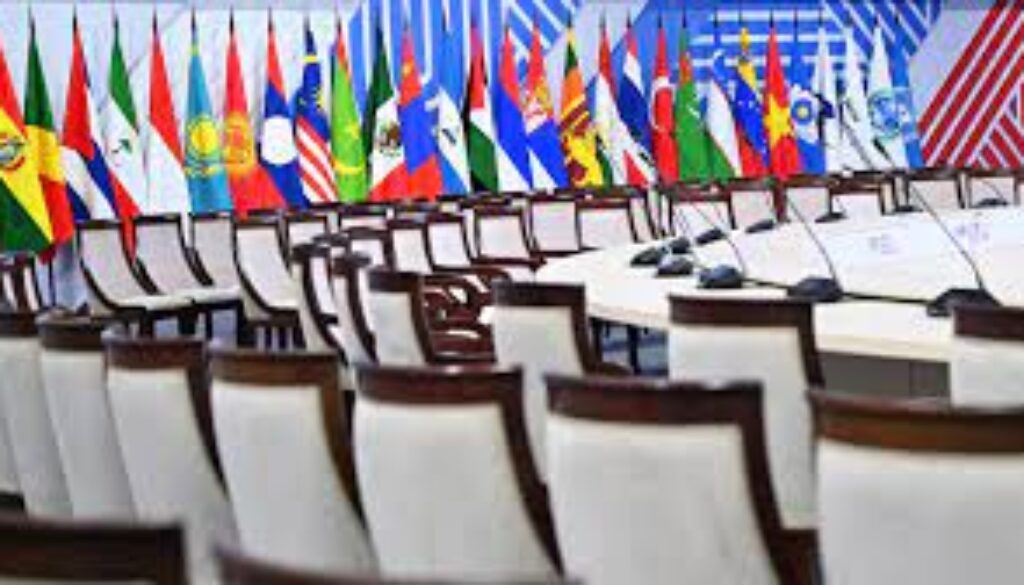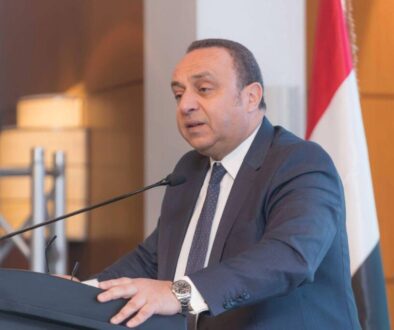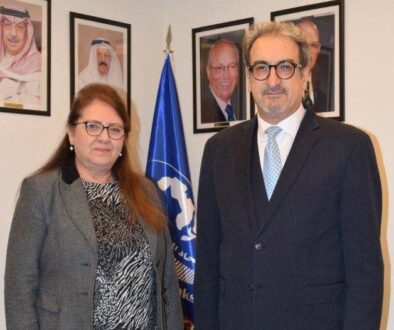BY DR SOHA MAAD
Introduction
A new world order is emerging following the Euro-Gulf and BRICS (Brazil, Russia, India, China, and South Africa) summits held in 2024. Below we overview these summits and their final declaration, we assess their impacts, and highlight their major controversies.
We conclude with an outlook on the future world order shaped by the Euro-Gulf and BRICS summits and we put forward a roadmap for Arab banks in light of this new evolving world order.
Euro Gulf Summit 2024 Overview and Declarations
The first-ever Euro-Gulf Summit took place on October 16, 2024, in Brussels. This summit brought together leaders from the European Union (EU) and the Gulf Cooperation Council (GCC) countries to discuss a wide range of issues, including trade, energy, climate change, and regional security. The summit aimed to strengthen cooperation and build a strategic partnership for peace and prosperity.
The final declaration of the Euro-Gulf Summit 2024 focused on building a Strategic Partnership for Peace and Prosperity. The key points from the declaration are:
- Trade and Economic Cooperation: Both parties reaffirmed their commitment to enhancing trade and investment partnerships. They discussed the potential for a regional EU-GCC free trade agreement and explored tailor-made trade and investment agreements.
- Energy Cooperation: The EU and GCC committed to intensifying their cooperation on energy security, including energy efficiency and renewable energies.
- Regional Security: Leaders emphasized the importance of promoting global and regional security, preventing conflicts, and resolving crises through enhanced dialogue and coordination.
- Humanitarian Efforts: The summit called for an immediate ceasefire in Gaza and Lebanon, and stressed the need for humanitarian access.
- Multilateral Cooperation: The summit highlighted the need to work together to tackle global challenges and support multilateralism.
The summit was co-chaired by European Council President Charles Michel and Qatari Emir Sheikh Tamim bin Hamad Al Thani. It was seen as a significant step towards deepening the partnership between the EU and GCC.
Impact of Euro Gulf Summit 2024
The EU and GCC are currently among the most significant global blocs, given their vast capabilities and resources. Together, they represent a huge economic power, accounting for over 20% of the world’s gross domestic product (GDP). From a geostrategic perspective, the EU is an important and influential international power globally, considering its significant military capabilities and the technological and economic development level of its 27 member states, as well as its large population of over 450 million, making it the third-largest bloc worldwide. These capabilities enable the EU to play a leading role in addressing security, military, political, economic, and climate challenges facing Europe and the world.
Likewise, GCC countries are gaining increasing international importance, not only due to their significant economic potential and their position as a main source of fossil fuel globally but also due to their growing political role on regional and international levels. They have become active players and reliable partners for all international powers in facing major global challenges and crises.
The Euro-Gulf Summit 2024 was seen as a significant step towards deepening the partnership between the EU and GCC, with a focus on peace, prosperity, and addressing global challenges.
Euro Gulf Summit 2024 Controversies
The Euro-Gulf Summit 2024 did face some controversies and criticisms:
Double Standards: Critics from the Global South pointed out that while EU nations repeatedly called out Russia over violations of international law in the Ukraine conflict, they failed to apply the same standards in war in Gaza. This led to accusations of double standards in the EU’s approach to international conflicts.
Middle East Crisis: The summit took place amid an extremely dangerous escalation in the Middle East, with conflicts in Gaza and Lebanon dominating the agenda. While the EU and GCC leaders called for an immediate ceasefire and humanitarian access, some critics felt that the summit did not go far enough in addressing the root causes of these conflicts.
Humanitarian Concerns: There were concerns about the effectiveness of humanitarian measures and whether they would be implemented in practice.
Geopolitical Tensions: The summit highlighted the geopolitical tensions between the EU and GCC countries, particularly in relation to Russia’s war against Ukraine and the broader regional security issues.
These controversies underscore the complexities and challenges of fostering a strategic partnership between the EU and GCC countries.
BRICS 2024 Overview and Declarations
The 16th BRICS Summit took place in Kazan, Russia, from 22 to 24 October 2024, under the theme “Strengthening Multilateralism for Just Global Development and Security”. The summit brought together leaders from Brazil, Russia, India, China, and South Africa (BRICS) to discuss key global issues and strengthen their strategic partnerships.
Key points from the Kazan final declaration are:
Multilateralism and International Law: BRICS leaders reaffirmed their commitment to multilateralism and upholding international law, including the principles enshrined in the United Nation (UN) Charter.
Global Security: The declaration emphasized the importance of promoting global and regional security, preventing conflicts, and resolving crises through dialogue and diplomacy.
Economic Cooperation: The summit highlighted the need to reform the international financial architecture to make it more inclusive and just. This includes initiatives like the BRICS Grain Exchange and the BRICS Cross-Border Payment System.
Humanitarian Efforts: Leaders expressed grave concern over the humanitarian crises in the Occupied Palestinian Territory and Southern Lebanon, calling for immediate ceasefires and humanitarian access.
BRICS Plus: The summit included an “outreach” dialogue with emerging markets and developing countries (EMDCs) from Africa, Asia, Europe, Latin America, and the Middle East, under the theme of “BRICS and Global South: Building a Better World Together”.
The summit was seen as a significant step towards deepening the partnership between BRICS countries and promoting a more representative and fairer international order.
BRICS 2024 Impact
The BRICS 2024 Summit had several significant impacts on both the member countries and the global stage:
- Economic Influence: With the addition of new members like Egypt, Ethiopia, Iran, Saudi Arabia, and the United Arab Emirates UAE, BRICS now represents nearly half of the world’s population and a significant portion of global GDP. This expansion strengthens BRICS’ position as a counterbalance to Western economic dominance.
- Energy Security: The summit emphasized the importance of energy security and cooperation among member countries. This includes initiatives to develop alternative energy sources and reduce dependence on western energy markets.
- Financial Independence: BRICS countries discussed reducing reliance on western financial systems, such as the United States US dollar and SWIFT (Society for Worldwide Interbank Financial Telecommunications) payment network. This includes promoting the use of national currencies for trade transactions and developing new financial institutions.
- Global Security: The summit highlighted the need for global and regional security, with a focus on preventing conflicts and resolving crises through dialogue and diplomacy. This includes addressing humanitarian crises in regions like Gaza and Lebanon.
- Multilateral Cooperation: BRICS emphasized the importance of multilateralism and cooperation among emerging markets and developing countries. This includes building new institutions and mechanisms to support global development and security.
The BRICS 2024 Summit showcased the bloc’s growing influence and its commitment to empower a more multipolar and just global order.
BRICS Expansion
The BRICS 2024 Summit marked a significant expansion of the bloc. The summit welcomed six new members: Egypt, Ethiopia, Iran, Saudi Arabia, the United Arab Emirates (UAE), and Argentina. This expansion brings BRICS’ membership to a total of 13 new countries, including Algeria, Belarus, Bolivia, Cuba, Indonesia, Kazakhstan, Malaysia, Nigeria, Thailand, Turkey, Uganda, and Vietnam.
This expansion is seen as a move to strengthen BRICS’ influence and create a more representative and inclusive global order. The new members are expected to contribute to the bloc’s economic, political, and strategic goals, further diversifying its capabilities and reach.
BRICS 2024 Controversies
The BRICS 2024 Summit faced several controversies and criticisms. The inclusion of Iran and the expansion of BRICS were seen by some western observers as a move to counter western influence and strengthen a multipolar world order. This raised concerns about the bloc’s alignment and potential geopolitical conflicts. Despite the expansion, there were disparities among the member states’ ambitions and priorities. The lack of substantial developments on core topics highlighted these differences, raising questions about the bloc’s unity and shared goals. Many western observers viewed BRICS as an increasingly anti-western organization, especially given the summit’s location in Russia and the inclusion of Iran as a full member. This led to accusations of double standards in addressing international conflicts.
The BRICS bloc faced challenges in reaching a workable economic and monetary consensus. The members did not share the political will to make this consensus a reality, which hindered progress on key economic initiatives. Moreover, the expansion raised questions about BRICS’ identity and shared values. The bloc’s diverse membership and varying political systems made it difficult to establish a unified vision and purpose.
These controversies underscore the complexities and challenges of fostering a cohesive and effective partnership among BRICS countries.
The Geoploitics of BRICS 2024
The geopolitics of BRICS in 2024 are complex and multifaceted, reflecting the bloc’s growing influence and the shifting global power dynamics. BRICS is seen as a driving force behind the transition to a multipolar world order by expanding its membership and strengthening its economic and political ties. BRICS emphasizes the importance of global and regional security, advocating for peaceful resolution of conflicts and coordinated international responses. The bloc’s commitment to multilateralism and international law is seen as a way to address global crises and promote stability.
The expansion of BRICS has brought together a diverse group of countries with varying political systems and economic interests. This diversity presents both opportunities and challenges for the bloc, as it seeks to maintain unity and coherence in its strategic agenda. The geopolitics of BRICS in 2024 reflect the bloc’s efforts to reshape the global order and promote a more inclusive and equitable international system.
World Order Following BRICS And EU Summits 2024
The BRICS and EU summits in 2024 have significantly influenced the global world order, highlighting a shift towards a more multipolar world.
The expansion of BRICS and the strengthening of EU-GCC ties indicate a move away from a unipolar world. This shift promotes a more balanced global power structure, with emerging markets and developing countries gaining greater influence.
The summits highlighted the need for energy security and cooperation. This includes developing alternative energy sources.
Both summits addressed global security issues, with BRICS focusing on preventing conflicts and resolving crises through dialogue and diplomacy, and the EU-GCC summit emphasizing regional security and humanitarian efforts.
The EU-GCC summit called for immediate ceasefires and humanitarian access in conflict zones, while BRICS expressed concern over humanitarian crises and emphasized the need for multilateral cooperation.
These summits reflect a growing trend towards a more inclusive and multipolar world order, with emerging markets and developing countries playing a more significant role in global governance.
Roadmap For Arab Banks In The New World Order
In light of the final declarations and impact of the BRICS and EU-Gulf summits held in 2024, the Union of Arab Banks suggests a new roadmap for Arab banks, focusing on several key areas:
- Economic Diversification: Arab banks are encouraged to diversify their economies, reducing reliance on oil revenues.
- Financial Independence: There is a push towards reducing dependence on western financial systems, including exploring alternative currencies and payment systems.
- Sustainable Finance: Arab banks should adopt sustainable financial practices, aligning with global standards for environmental and social sustainability.
- Financial Digital Transformation: Embracing digital transformation in the financial sector is crucial.
- Regional Cooperation: Strengthening economic and trade ties within the region and with BRICS countries is a priority. This includes exploring new trade agreements and investment opportunities.
- Energy Security: Collaborating on energy security initiatives, including renewable energy projects and energy efficiency measures, is essential for long-term sustainability.
- Humanitarian Efforts: Arab banks are also expected to play a role in supporting humanitarian efforts, particularly in conflict zones, by facilitating financial aid and development projects.
These steps aim to position Arab banks as key players in a more multipolar and resilient global financial system.



